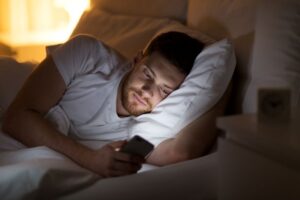
Sleep apnea is a serious health condition that disrupts the quality of rest for millions of people each night. Any adjustments you make to improve your nightly shuteye are worth it! However, you might not realize that your smartphone could be one of the biggest obstacles to restful sleep. How might your phone be affecting your sleep quality, and what can you do about it? This blog post explains.
How Your Phone Can Affect Your Sleep
There are two big reasons why your phone might be adversely affecting your sleep:
Blue Light Exposure
Smartphone screens emit a type of light known as blue light. This light closely resembles natural daylight, which signals your brain that it is time to be alert and awake. When you use your phone before bed, the blue light can suppress the production of melatonin, the hormone responsible for regulating your sleep-wake cycle. In turn, lower melatonin levels make it more difficult for your body to transition into a restful state, leading to longer periods of wakefulness and more fragmented sleep.
For someone with sleep apnea, whose sleep is already disturbed by breathing interruptions, this effect can compound the problem.
Mental Stimulation
In addition to blue light, the content you engage with on your phone also plays a role in keeping your mind active. Reading emails, browsing social media, or watching videos stimulates your brain, elevating cognitive activity when your body should be winding down. This mental engagement delays relaxation and increases the time it takes to fall asleep.
Furthermore, notifications and alerts can disrupt your sleep cycle, waking you up multiple times throughout the night. For individuals with sleep apnea, whose sleep is already broken by physical interruptions, the addition of technology-related disturbances can significantly affect the quality of rest and overall health.
Adjust Your Habits for Better Rest
If you wish to improve your sleep quality, you can take several practical steps to prevent your phone from interfering with your rest. Try the following tips:
- Place your smartphone in another room or across the room from your bed to limit access before sleep.
- Set a specific bedtime and avoid using your phone at least one hour before you intend to sleep.
- Activate the “Do Not Disturb” or “Sleep Mode” feature to silence notifications during the night.
- Use blue light filters or night mode settings to reduce exposure if you must look at your phone in the evening.
- Replace nighttime scrolling with a relaxing activity, such as reading a book, practicing gentle stretches, or listening to calming music.
- Establish a consistent nighttime routine that signals to your body it is time to sleep, such as dimming the lights, changing into your pajamas, and drinking a warm cup of herbal tea.
- If you use your phone as an alarm clock, consider switching to a traditional alarm to avoid the temptation to check your device late at night.
Smartphones are certainly useful, but they also pose a threat to your sleep! Make any necessary changes so you can start getting better rest every night.
Meet the Practice
At Aveni Dental Professionals, we belong to an elite sleep apnea partnership known as Sleep Architects. We do all we can to help patients achieve better rest. For example, we offer custom oral appliances that can promote easier breathing at night. To learn more about us or to request a consultation, contact our Plymouth, MA, office at 508-217-7454.
